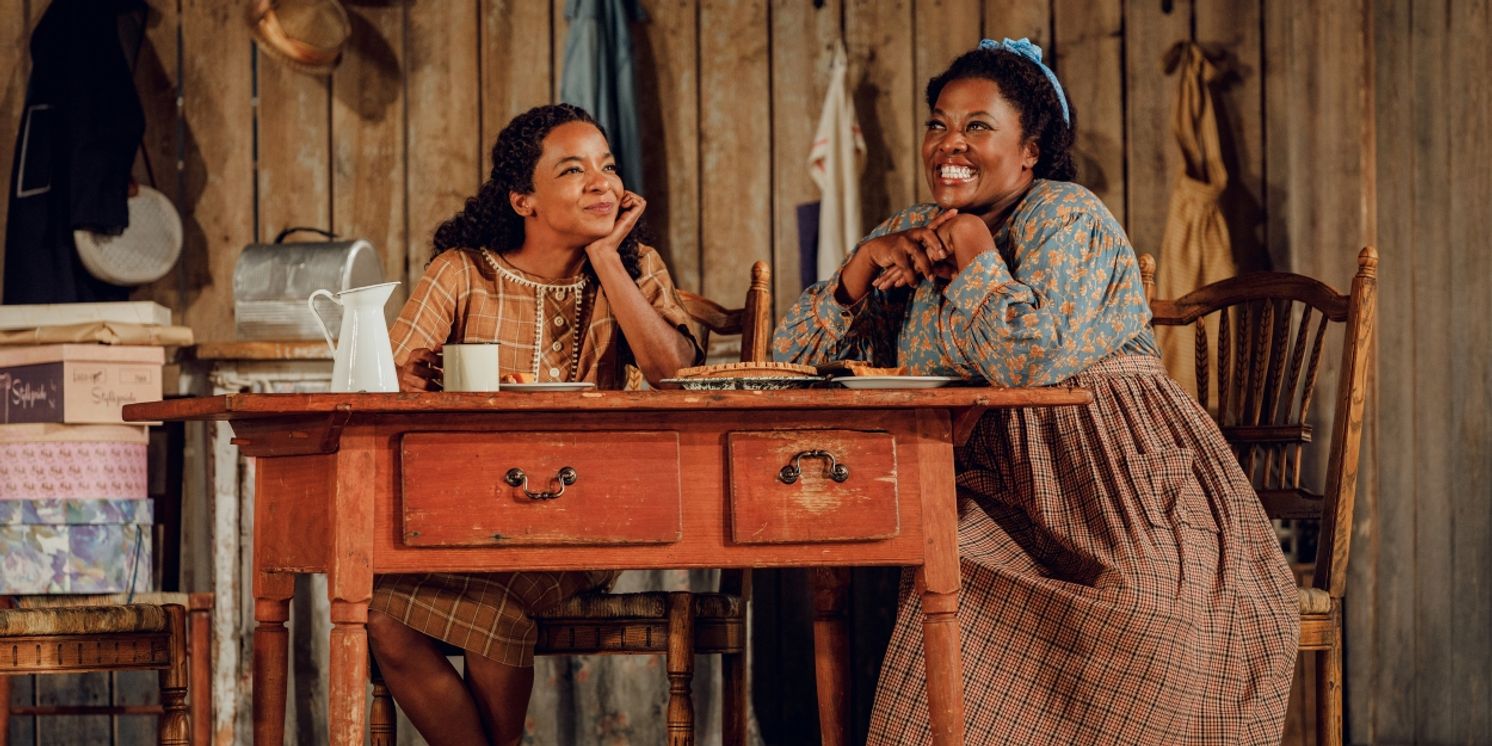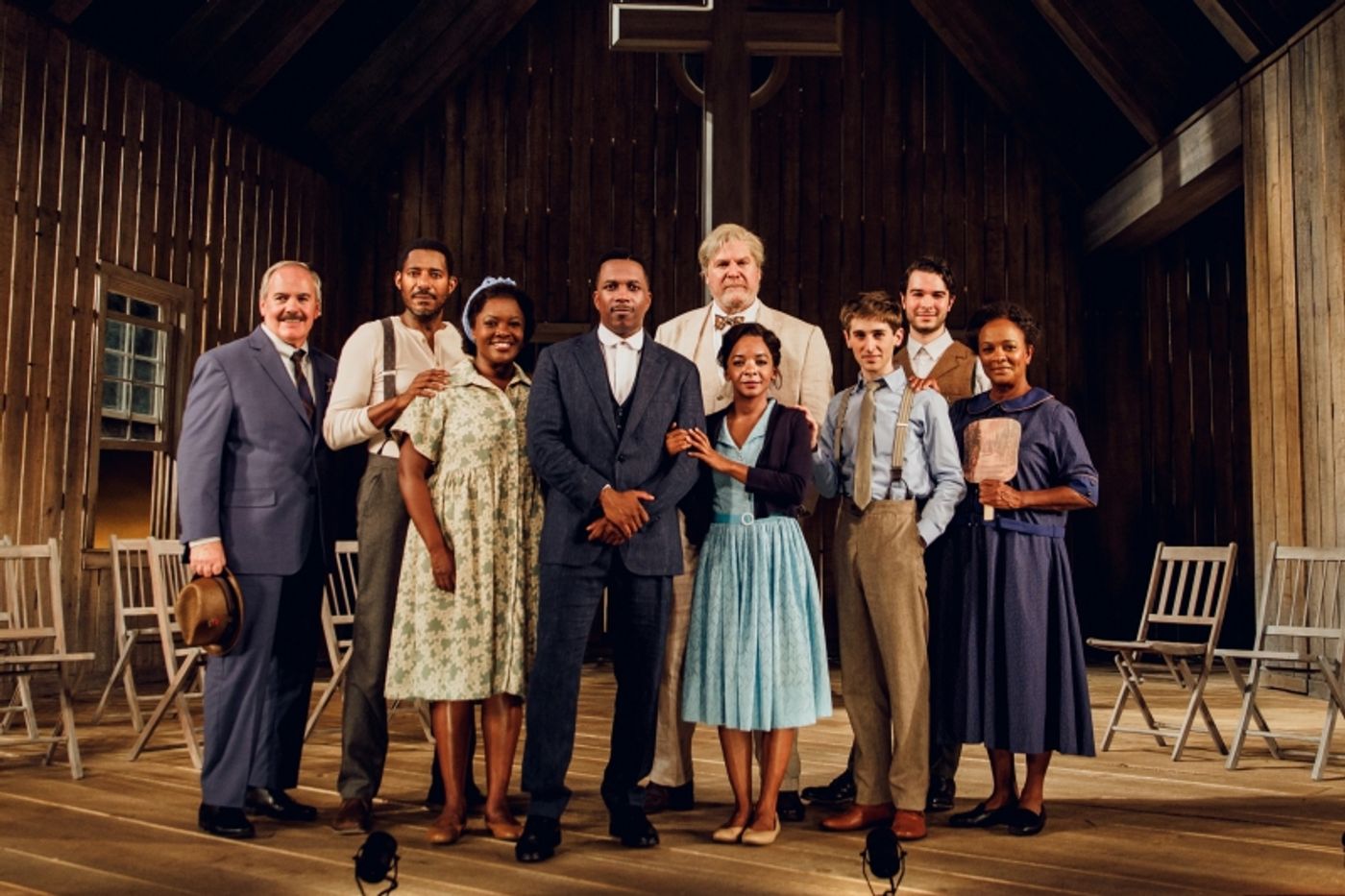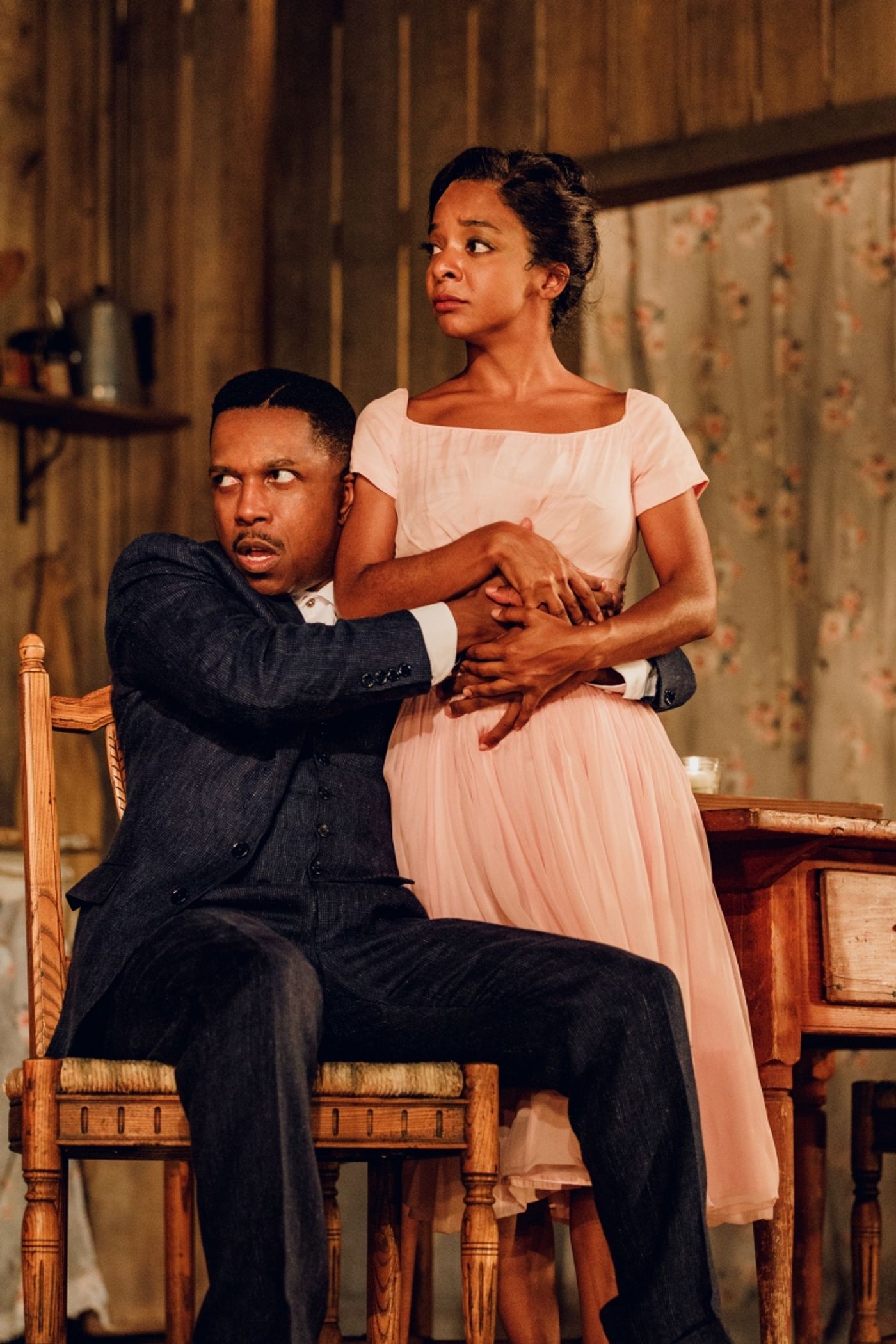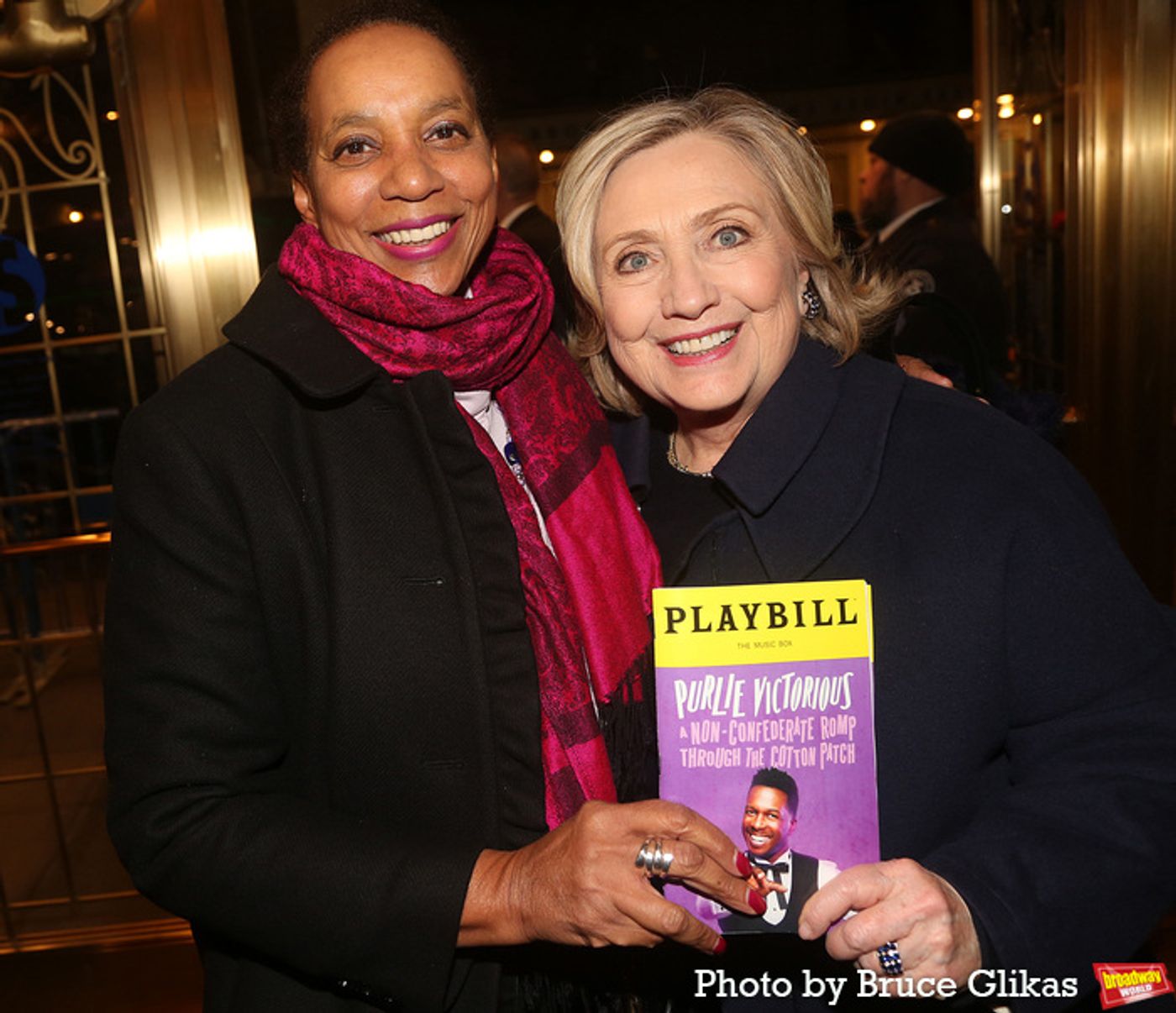Exclusive: Hasna Muhammad, Daughter of Ossie Davis and Ruby Dee, Reflects on the Women of PURLIE VICTORIOUS
Purlie Victorious will play its final performance on February 4, 2024.

As Purlie Victorious enters its final weekend on Broadway, BroadwayWorld is very excited to share an exclusive essay written by Ossie Davis and Ruby Dee's daughter, Hasna Muhammad, who played a key role in getting this landmark play back on Broadway.
Enjoy "The Women of Purlie Victorious" by Hasna Muhammad below:
I grew up with Purlie Victorious. Purlie’s voice carries the stories that my father told us about his own life in Cogdell, Georgia. Purlie’s poetic speech is part of our familial vernacular and contains the history my father made sure we knew. The instruction in Purlie’s benediction is always hovering as a reminder of how to be in this world.
I was four years old when Purlie Victorious opened on Broadway starring Ossie Davis and Ruby Dee. Dad and Mom to me. I don’t remember seeing it in 1961, but I do remember seeing the 1963 film adaptation, Gone Are the Days and Purlie, the Tony award winning musical adaptation in 1970. The current revival, directed by Kenny Leon and starring Leslie Odom, Jr. and Kara Young, is my first experience with the play as my father wrote it, and Purlie Victorious is speaking to me.
Purlie Victorious is an American story about a man in the Jim Crow south who uses a little bit of wit and a little bit of the Constitution to get the money to reopen his grandfather’s church and preach freedom in the Cottonpatch. Without an intermission in this production, the structure of the three-act play is fluid and crisp. The performances are hilarious, and all the characters pull me into the plot with humor and bite as they navigate racism, segregation, identity, generational wealth, and self-love. My father’s facility with language—including the words he invented—is ingenious, and after 62 years, his use of humor as a tool of resistance still resonates. I believe that Purlie Victorious is an American theatre classic.
Dad passed away on February 4, 2005. Every time I go to the Music Box Theatre to see the play I get the chance to visit with him again. I am surrounded by his words and feel as if he is talking just to me. If I listen hard enough, I hear his voice and believe that he and my mother know that I am there. On the edge of my seat. Savoring every moment of every performance I can. Each time I laugh anew and am moved by the relevance of the play and its truth. Each time I discover another layer of humanity in the characters. Another interpretation of the text. Each time I try to find Daddy’s message to me, his little Black girl. His grown Black daughter. And each time, I am inextricably drawn to the women of Purlie Victorious.
Purlie’s victory relies in part on the persuasiveness of three Black women— Lutiebelle Gussiemae Jenkins, played by Kara Young, Missy Judson, played by Heather Alicia Simms, and Idella Landy, played by Vanessa Bell Calloway. Lutiebelle is an innocent, tough young daughter/sister whose naiveté transforms into bravery because of Missy’s unconditional love for her and Purlie’s articulation of her self-worth. Despite the circumstances of her neglected, parentless, transient upbringing, Lutiebelle becomes a self-sufficient woman who grows to defend herself and others. It is Lutiebelle who impersonates Cousin Bee to trick Ol’ Cap’n, the Confederate plantation owner, into giving Purlie $500 to buy back Big Bethel. Without Lutiebelle’s cooperation, there is no money and therefore no church. Lutiebelle’s devotion to Purlie as his “disciple” is what fuels him, and his need to defend Lutiebelle’s honor causes the plot to thicken and crest.
Missy is the mother/sister figure who cares for the family and the community with food, flowers, and open arms. Missy truly loves Gitlow, her self-proclaimed “Uncle Tom” husband who she convinces–albeit with violence—that he must participate in the ruse to fool Ol’ Cap’n. She loves Purlie too and holds both men accountable for their actions. Missy’s love is also the catalyst for the character arcs of both Lutibelle and Gitlow.
Idella is the mother/teacher figure who cares for the home and son of Ol’ Cap’n. Idella is the defiant businesswoman who parlays the power she has in Ol’ Cap’n’s house. She broaches the topic of the Supreme Court ruling to desegregate schools with Cotchipee’s son, Charlie, and grooms him to be an ally. She also uses her influence to keep Purlie out of jail. Without Idella, the ploy would not work, and the story would not end well.
While my father depicted these women in relationship to the nuanced lives of Black and white men in America, he did so in a way that elevates the value of women in society and in the plot. More than being tropes, these characters are outspoken, strong-willed, intelligent, and strategic. On their own, they command respect with their presence. Together, they pave the way for Purlie to be victorious.

I arrange to go backstage to talk about these characters with Kara, Heather, and Vanessa one Saturday between shows. I climb two flights of stairs to Kara’s warmly lit dressing room which is draped in colors and indigenous patterns and has a funky-hip dorm room vibe. The wall above the mirror and one adjacent wall are covered with images. There are photographs from the 1961 Purlie Victorious Broadway production, photos of Dad, and even more photos of Mom. I had seen them all before except one. Kara has a copy of Mom’s book, My One Good Nerve, near her record player, and the album Why Mosquitos Buzz in People’s Ears, a story that Mom narrated, is propped up on the back of the couch. Above the couch is The Thespian, a stunning portrait of Kara by Tim Okamura. Kara welcomes me in, and I immediately feel at home.
When Heather and Vanessa join us, we all sit around a circular ottoman covered in fabric. I unpack the bag of food I brought in from a nearby restaurant, and we settle down to talk above the din of 45th Street voices and music that waft in through the Open Window. Kara in a chair with a photo of Mom behind her, Heather on the couch next to me, and Vanessa on the floor where I eventually join her. It is clear that these three women are family to each other, and today that bond includes me.
I recognize my mother in Kara. There is a cousin-like resemblance between them. Similar build. A familiar nose. And in Lutiebelle’s French twist, Kara almost brings my mother onto the stage. Kara’s portrayal of Lutiebelle is her own. It is the sensitivity of Kara’s vessel—the place where characters settle and grow—that reminds me of my mother. And when not performing—like Mom—Kara speaks in metaphors that go deep and require us to follow her into talk of making space for the unseen and unheard. Heather is like Dad. She is cut from cloth set in the same dye pot tinted with an even disposition and a generous smile. She exudes patience and humility, and she sprinkles a little bit of history and politics in her comments now and then. Vanessa’s presence is palpable and straight forward. Her brushed copper voice is pebbled as she testifies her faith in the signs that brought her to this production and considers them as blessings. She is uncompromising in the love of her family, especially her daughters, and the care of herself.
Kara, Heather, and Vanessa have yet to don their characters as we begin to eat and chat about the women who they will become in a just a few hours. I am hyper conscious of their time and start to talk perhaps too much about what I see in Lutiebelle, Missy, and Idella—a composite of the women who raised my father in a loving community that included his mother, grandmother, aunts, as well as sisters so-and-so who doted on the first born male child who almost died from fever as a baby. I am reminded most of those closest to him, and therefore to me: his mother, his sister, and his wife.
Missy reminds me of Daddy’s mother. Like Missy, Gram had a wide embrace. She took care of her household and always wore an apron. Also like Missy, she was ready for battle when necessary. Once she walked a few miles with a pistol in her bosom to warn Grandpa Kince about a threatening note from the Ku Klux Klan. Idella reminds me of Daddy’s sister. Aunt Essie was a smart woman who had to delay her education to take care of her four brothers, and for Daddy, that included physically fighting his battles. She eventually became the top African American woman in the Veteran’s Administration and could whip up a pan of rolls like magic. My mother had to fight for her existence as a Black child, woman, and actor, and I am reminded of that fight in Lutiebelle who adores Purlie like my mother adored my father. And that is where we start.
 My mother thought my father had written the role of Lutiebelle with her in mind, but he hadn’t. He was not sure that she, as a dramatic actor, could play a comedic role, so he agreed that she should audition for the part. As talent would have it, my mother became the first woman of Purlie Victorious when she played Lutiebelle in 1961. She as well as Helen Martin as Missy and Beah Richards as Idella originated the roles at a time when Black actors and playwrights were making history on Broadway as the “firsts.” My mother fiercely battled age, gender, and race discrimination and their effects on her ability to fully express her craft as compared to her white counterparts. Kara, Heather, Vanessa, and I blow sister-speak through pursed lips noting that the discrimination persists. And while there may be more Black women on Broadway these days, there is still need for more of us especially in production offices and on backstage crews. The lack of diversity in the industry is what my parents talked to me about as I was growing up. The current burgeoning of Black playwrights writing Black stories for Black actors in shows mounted on Broadway by Black producers is what they fought for in a struggle that continues. I know my parents would be so proud that Purlie Victorious enabled a diverse cast, crew, and creative team to work on Broadway, I tell them. They would be so proud of you, I say.
My mother thought my father had written the role of Lutiebelle with her in mind, but he hadn’t. He was not sure that she, as a dramatic actor, could play a comedic role, so he agreed that she should audition for the part. As talent would have it, my mother became the first woman of Purlie Victorious when she played Lutiebelle in 1961. She as well as Helen Martin as Missy and Beah Richards as Idella originated the roles at a time when Black actors and playwrights were making history on Broadway as the “firsts.” My mother fiercely battled age, gender, and race discrimination and their effects on her ability to fully express her craft as compared to her white counterparts. Kara, Heather, Vanessa, and I blow sister-speak through pursed lips noting that the discrimination persists. And while there may be more Black women on Broadway these days, there is still need for more of us especially in production offices and on backstage crews. The lack of diversity in the industry is what my parents talked to me about as I was growing up. The current burgeoning of Black playwrights writing Black stories for Black actors in shows mounted on Broadway by Black producers is what they fought for in a struggle that continues. I know my parents would be so proud that Purlie Victorious enabled a diverse cast, crew, and creative team to work on Broadway, I tell them. They would be so proud of you, I say.
I ask Kara, Heather, and Vanessa how they prepared for their roles. As actors, they create backstories for their characters and draw upon their own lives to become the women of Purlie Victorious eight times a week. Their backstories exude love, sisterhood, motherhood, and what Black women do for each other and their families to create community. In this shared backstory, Idella, Missy, and Lutiebelle have gone to each other’s homes and have spent time together. They know, support, and love each other. Missy and Lutiebelle are to each other the mother and daughter that neither of them had, and Idella, who knows the plan, is the protector of them both. These women are the self-proclaimed “tent poles of the cotton patch.”
Kara, Heather, and Vanessa organically evoke the stories of their own mothers, grandmothers, great grandmothers, and aunts—all the women they have known including themselves. Kara “absorbs the world” and brings onto the stage the perspective of the oppressed and the enslaved by reading passages of their narratives every day. Heather mentions her farming family, some of whom picked tobacco and cotton, and knows first-hand the significance of generational property. A few women in Vanessa’s family were maids including her mother, and Vanessa speaks of herself as “a mother for real.”
Purlie Victorious is full of luscious and profound dialog that makes the audience laugh or gasp in unison. We recall several lines from the play with Purlie’s benediction as a favorite among us, but we focus on the lines that Lutiebelle, Missy, and Idella deliver which activate some of the themes in the play and enable the plot to unfold. When Lutiebelle tells Purlie, You are and always will be the hero of Cotchipee Hill, she bolsters his manhood and triggers the grace that Purlie finally uses to transform the Cotton Patch. Several lines come from Missy. Heather mentions when Missy tells Lutiebelle that she’s been praying for me a daughter just like you. That line gives them both purpose and fulfills a need they each have. The line Being colored can be a lotta fun when ain’t nobody looking centers Blackness and is a prelude to the release of the white gaze that Purlie articulates later in the play. I mention Missy’s threat to Gitlow, If I ever catch you with that song in your mouth again, I’ll choke you with it. We agree that the line tells Gitlow that he need not wear his Uncle Tom mask at home among family which gives him permission later to remove the mask altogether. Vanessa and I both mention the moment when Idella reminds Charlie, Whatever happens to you happens to me. With it, my father is reminding us of the symbiotic relationship between the state of white America and the fate of Black America. He is also alluding to Idella’s teachings which influence Charlie to do what he does. One exchange between Missy and Lutiebelle that resonates with us all is Where there’s a will there’s a woman. And where there’s a woman there’s a way. When Missy said her line to Lutiebelle one evening, Heather caught sight of Hilary Clinton in the audience. Heather thought “Wow. This woman tried to do this thing.” She also thought about Black women who are “still trying to save this democracy. This Republic. And that we are going to do what we have to do always because of our strong will.” I think about what my grandmother, aunt, and mother must have done to ignite in my father the inspiration to honor Black women and empower Black female characters; to hold our mirrors so that we might behold our dark and holy vessels in whom should burn that golden nut-brown joy which Black womanhood was meant to be.

As we sort the remnants of our meal, and I prepare to depart, we confess that it is refreshing to focus on the women of Purlie Victorious. We also acknowledge the absent presence of white women in the play. There is only reference to Miz Emmy Lou, Lutiebelle’s former employer and Charlie’s mother who died almost before he was born. As inclusive as it is, this play is unapologetic about Black love and Black joy. And that sits well with us this afternoon. Kara, Heather, and Vanessa are proud to center Blackness on a Broadway stage. Kara says that “there's something really incredibly beautiful about being Black on a stage. A real true physical freedom that I don't think I've really truly ever experienced on a stage like this.” Vanessa says, “I'm just so proud to be up there and standing so strong and just feeling great every night about whatever's coming out my mouth. However I'm standing. However I'm looking—head rag and all.” I feel proud too. Humbled by the reverence for my father’s work, and comforted by his words of hope for me—to love and be loved. To be self-assured. To find a way. And performance after performance, I watch these women demonstrate how it is done.
After we take a few selfies and watch a YouTube video of Vanessa dancing with her daughters, I am the last to leave Kara’s dressing room. I glance again at the images on the wall and with a full heart suppress the desire to linger opposite the static gaze of my parents. Instead, I inhale the love for them and this play that hangs in the air along with a hint of our meal so grateful for my time with these incredible women of Purlie Victorious. I descend the stairs that Kara, Heather, and Vanessa have already left and open the stage door onto the sidewalk already cordoned off for fans who will wait for the cast after the evening show.
Purlie Victorious has been described as my father’s love letter to America in general and to Black people in particular. I believe it is also a love letter to Black women. To all the wonderous daughters who knoweth not the glory of themselves. A letter Daddy knew would matter so much for us to hear right now, especially my sister, daughter, nieces, and me. As I step into the chill of the evening, it dawns on me that—along with the Associate Director, the Production Stage Manager, the Stage Manager, the female producers, understudies, crew, creatives and women who work the Back and Front of the House—I too am a woman of Purlie Victorious. I am a Queen of Sheba.
Powered by
|
Videos

